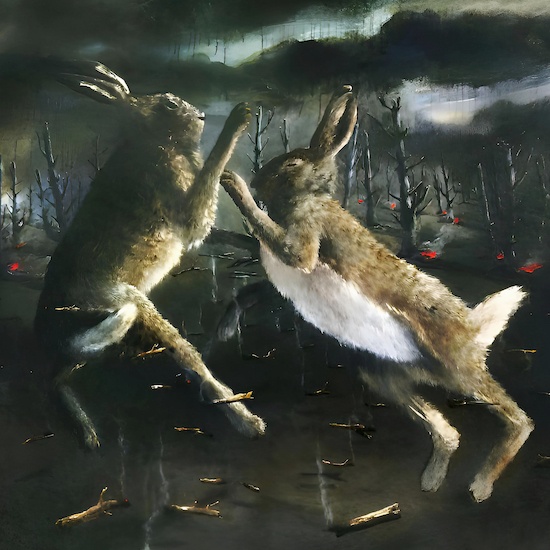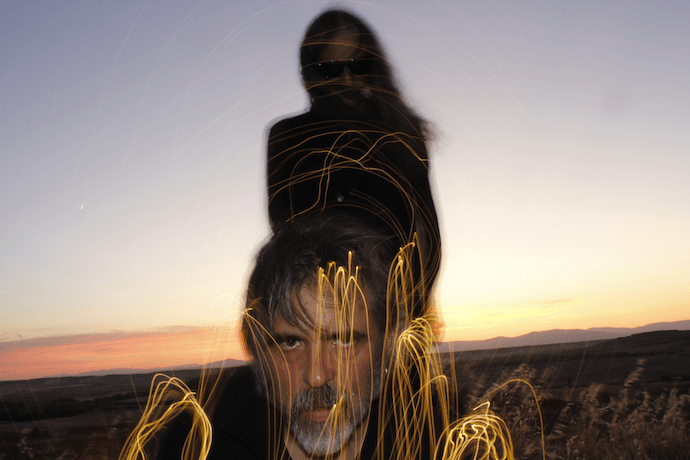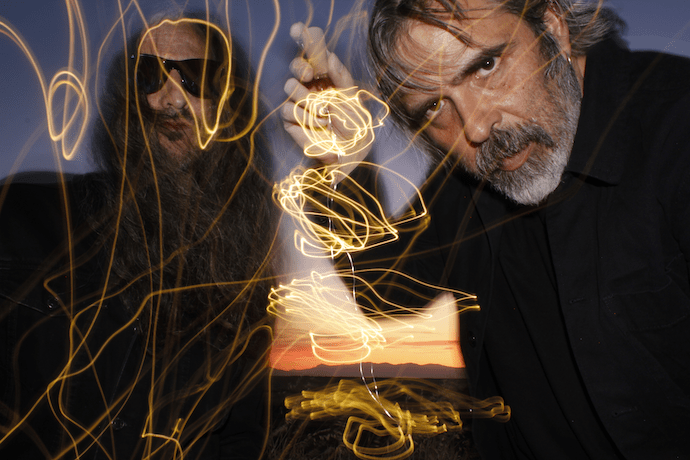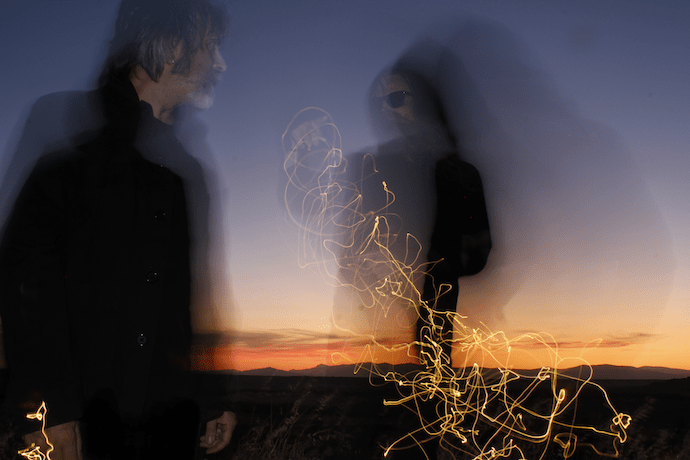
The odds are high that once you’ve seen the painting above by Paloma Pájaro that adorns the cover of TodoMal‘s new album The Greater Good, you won’t forget it. The odds are also high that it may perplex you. The choosing of the art was obviously unconventional, but then again, so is the music.
The Greater Good is the second full-length by the TodoMal duo of Christopher B. Wildman and Javier Fernández, following the release of Ultracrepidarian in 2021. As they conceive it, the new album follows dark paths, “where doubts about what is right or wrong, what we do in this world to earn redemption, or why we have a nefarious tendency to destroy what we love are depicted against a smoldering forest”. “The journey continues,” as they say, “despite the obstacles”.
And so we have a Spanish band whose name means something like “all is evil” or “all is wrong” ambitiously seeking “The Greater Good”. They put a lot of thought and work into making it a continuation from their first album that would both expand their ambitions and manifest them more precisely, and today you’ll be able to hear every minute of what they achieved in advance of its release on November 24th by Ardua Music.

In addition to providing a full stream of the album (with our own thoughts about it, of course), we’re also sharing the extensive thoughts of these Spaniards about each song and the album experience as a whole. It’s not dull reading by any means, so we encourage you to take it in down below, right after the stream and the usual links.
Hurrying listeners find value in genre descriptions, and we’ll provide some, while hastening to add that they might be misleading, because The Greater Good really doesn’t fall into any neat categories. While the songs are connected like links in a chain, they’re also often significantly different from each other, the links made from different substances.
So we can suggest the genre term “doom” or perhaps “atmospheric doom” or “cosmic doom”, but this is as much a rock album as a metal album. We can also pass on the idea that the album will appeal to fans of Candlemass, Krux, Pink Floyd, Avatarium, and old Ghost — which should begin to give you an idea about the limitations of those genre terms above.
We can also mention that the music includes not only conventional metal instruments but also acoustic guitars of differing styles, occasional orchestration, piano melodies, and a range of human voices, including Wildman‘s impassioned singing and the angelic, operatic intonations of guest vocalist Teodora Gosheva.
But as noted above, what this adds up to is a many-branching pathway.

“Silent Mass” opens the journey in harrowing and haunting fashion. The low end is humongously heavy and heaving, moaning and groaning, but the song is illuminated by wild flickerings of shrill sound and serpentine tendrils of exotic melody, and elevated by grand towering chords, Wildman‘s soaring voice, a glorious guitar solo, and something like the peals of celestial voices. All at once, it’s daunting and vast, mesmerizing and spine-tingling, and it takes root in the head immediately.
If anything, “High Time” is even more massive, perhaps even more ethereal, but perhaps even darker in its mood. It’s also a theatrical piece, grand and elaborate, with wailing guitar solos that are captivating, and the pinging of otherworldly keyboard melodies that seem both cosmic and gothic.
Just those two songs reveal TodoMal‘s propensity for operating on a grand scale, their talent for interweaving a broad array of contrasting tonalities, bounded by bunker-busting heaviness and wraith-like shimmerings, and the marvels of Wildman‘s voice and the vocal harmonies that ensue.

The following songs add to the impression of the album as an earth-spanning and heavenly pageant. You can seem to feel mountains fracture and fall, and to see luminous visions beyond the mortal coil, to feel heartache and to exult in splendor.
But then you’ll also come to “Loss“, a soft, ringing lament that’s simply sublime (both that song and the closing title track feature acoustic guitar, and the closer includes funky and spacey bass lines in addition to many other marvels).
Upon reflection, it’s tempting to call the album an elaborate doom/rock opera, spanning a narrative of highs and lows, of doubts and defiance, of desolation and beautiful dreams.
Obviously, The Greater Good is well off our usual beaten paths at this site, but despite its dramatic differences from much of what we throw at your head, we hope you’ll indulge it with your time. Maybe you’ll become as thoroughly captivated by it as this writer.
As mentioned, the album features guest vocals by Teodora Gosheva and performances by Darío Garrido on the Spanish guitar, as well as a guitar solo on “Silent Mass” by Fernando Moya.
It was produced by Javier Fernández at Montseny Studios & Trinitat Studios, and it was mastered by Esoteric‘s Greg Chandler at Priory Recording Studios and Javier Fernández.
Back to that cover painting by Paloma Pájaro: Its name is “Zoosofías 100”, and it is used with the permission of Universitat de València (colección Martínez Gerricabeitia) and the artist.
Ardua Music will release The Greater Good on vinyl, CD, and digital formats. Find ordering info via the links below — and then do read TodoMal‘s extensive comments about the album after those.
ARDUA MUSIC:
https://arduamusic.bandcamp.com/album/a-greater-good
https://www.arduamusic.com/
https://www.facebook.com/ArduaMusicLabel
https://www.instagram.com/arduamusiclabel/
TODOMAL:
https://www.instagram.com/todo_mal_band/
https://www.facebook.com/todomalofficial
https://todomalband.bandcamp.com/
TODOMAL’S COMMENTS
This album holds profound significance for us, and we feel it not only solidifies our identity as a musical project but also builds upon the foundation laid by our debut record. Simultaneously, it serves as a catalyst for a more profound exploration of our artistic and personal boundaries.
Following the release of Ultracrepidarian, we found ourselves standing at the threshold of numerous partially opened doors, uncertain of which path to traverse for our next musical venture. The evolution of this journey unfolded organically as we navigated through a whirlwind of songs, demos, and projects we had accumulated. Despite the seemingly meticulous planning of the album, its essence is rooted in intuition and sporadic moments of inspiration that have gradually accumulated over the past two years.
We view this album not as a departure from Ultracrepidarian but rather as a more direct continuation. In terms of production, it signifies a heightened ambition and a newfound precision in reaching specific musical destinations. While Ultracrepidarian taught us valuable lessons on various fronts, leaving behind a monumental chaos, our initial challenge was to bring order to both our music and minds. This journey required a collective effort, resembling a group therapy session interwoven with musical exploration. Despite moments of serious doubt about our ability to see it through, our collective determination ultimately proved more robust than our individual insecurities, doubts, or fears. We make no claims about whether it will be preferred more or less than its predecessor. What we can confidently assert is that we’ve crafted the best album within the confines of our 100% DIY approach, on all levels.
Now, let’s offer a concise overview of the eight tracks that constitute the album:
*
“Silent Mass” winds around a central riff, playing with sonic contrasts between semi-empty verses and instrumentally rich choruses. The minimalist lyrics act as a dramatic mantra, portraying the silent mass that ensnares, silences, and slowly devours us—a metaphorical serpent embodying singular thought and the totalitarianism that attempts to forcefully direct our minds to opposing extremes, stealthily stalking the sanctuary of our thoughts and convincing us that 2+2=5.
*
“High Time” delves into situations where the path forward is obscured, akin to trudging through mud clinging to our feet. Faced with personal tragedies and gut-churning anger, our minds shield us from aggression, prompting a retreat into the safety of ignorance. This somewhat comical cowardice takes on a theatrical quality, with part of the instrumentation replaced by a dramatic orchestration of wind and string. The melody and structure themselves present an atypical song—a sinister vaudeville.
*
“Infero Tristi” began as a deliberately designed orthodox doom piece. We interweaved the concepts of God’s wrath, redemption, and overwhelming guilt with a litany in the choruses—Infero Tristi tibi quis fatetur? (Deep in your hell, who then shall confess you?). It evolves into a desperate plea for connection, a yearning for love, resembling a cry for a lifeline in the middle of an ocean of self-imposed guilt. Its quasi-liturgical ending is intended to linger in the mind after the song concludes, thanks in large part to the voice of our esteemed Teodora Gosheva, who graciously lent her voice throughout much of the album.
*
“Ultima Lucerna” stands as a small instrumental piece, a narrative separator, yet it carries a potent melancholy. It transports us to a world in collapse, where someone, indifferent to the chaos but conscious of it, sings in an abandoned room, awaiting the extinguishing of the last candle. This track is akin to a photo buried at the bottom of a drawer, almost a psychophony.
*
“Dust and Nothingness” explores the nostalgia for the future—a future not too distant where someone very close (imagined here as your own child, real or imagined) will inevitably drift away, entering the whirlwind of the world. It resigns to the pain of letting someone go, fading into oblivion. The melodic leitmotif, reminiscent of old wall clocks, nods to time running against us. The practically unresolved ending serves as a prelude or introduction to the rest of the album’s tracks (this song opens the B-side in the vinyl version).
*
“Antichrist Of Love” emerges as perhaps the most direct track. With a classic structure and medium tempo, this song serves as the Trojan horse of the album: the animalistic satyr bouncing off the walls inside our heads. Accessible in form but dramatic in essence, it delves into the sinister part of our hearts, our hedonistic side. We’ve occasionally referred to it as an exploration of our doppelganger, our absorbed twin that occasionally yearns to surface. The accompanying video attempts to reflect this with youthful superficiality, excess, and the coldness of an enticing yet hollow world. It’s not intended to be moralistic, as we’ve all played a part in this story. Instead, it offers the perspective of two individuals of a certain vintage observing this new scenario with a certain distrust. Perhaps it’s merely the classic evolution of thought as one ages—a blend of rejection and envy, accompanied by a somewhat distorted and unreal nostalgia about ourselves.
*
“Loss” unfolds as the acoustic piece of the album—a simple yet evocative song. Teodora’s voice illuminates the track, exploring themes of redemption and forgiveness, the search through loss. Stripping away hatred and preparing the heart to embrace peace, it creates a minimalist atmosphere before the album’s closure, lowering sonic intensity and leaving an acoustic guitar suspended in the air.
*
“A Greater Good” embarks on an extensive journey, intended to close the album with a special, ambitious piece—practically opera-rock, particularly in its final section. The lyrics delve into the existential questions that mark us throughout life: anguish, loneliness, or the need to cling to faith, the nostalgia of the past, or the innocence fading as reality falls upon our shoulders. The track unfolds in three parts: a liturgical air introduction (with Latin lyrics), the development of the theme, and the grand finale, closing the track and the album like a celebration. A secular communion, celebrating life—a radical idea within this musical context, in our opinion.
*
We hope that we’ve effectively conveyed all essential information for the time being. Certain aspects remain unaddressed, and some might not withstand scrutiny. Nevertheless, the overarching purpose of this entire journey has been the pursuit of a greater good.
Adios.

Yes, inderdaad GREAT
Great comment Ed